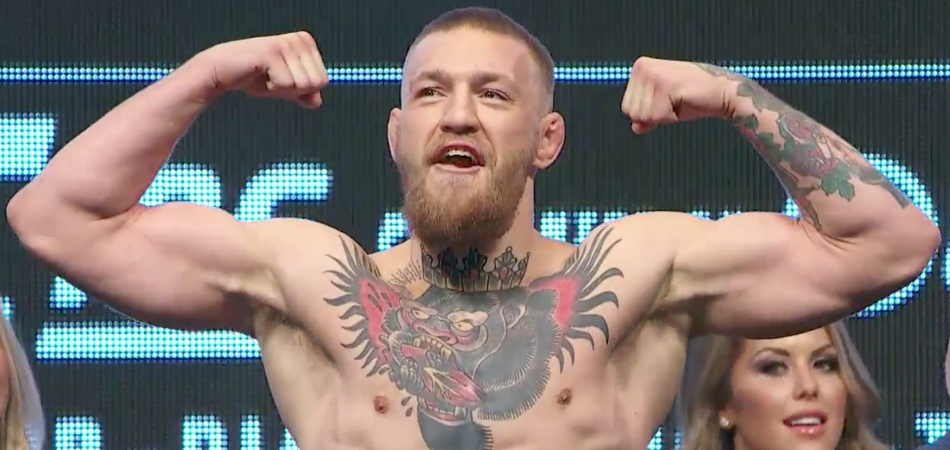In a sport as chaotic and volatile as mixed martial arts, it often pays to balance both the tangibles and intangibles of the fight game and avoid the hurricane of risk. Conor McGregor over the last number of years has thrown himself into that hurricane, caution to the wind. It was an habitual success, so why not? It was back to the well – over and over and over again.
Right up until it wasn’t a success.
Nate Diaz defeated Conor McGregor last Saturday night in the main event of UFC 196, but it originally wasn’t supposed to be Diaz standing across the cage from him.
The original bout was scheduled as McGregor, the featherweight champion, challenging Rafael dos Anjos for the lightweight championship in a historic champion-vs-champion contest. An already risky move for McGregor, but with another championship up-for-grabs the risk was worth the reward.
On February 23rd, 11 days from UFC 196, it was revealed that scheduled bout was no more. Rafael dos Anjos had broken his foot. The fight was off. Within 24 hours, McGregor was facing Diaz, at 170 pounds – 25 pounds and two divisions north of where he holds his gold.
On the surface the fight made little sense for McGregor. He was moving from featherweight to welterweight. What I just typed, “welterweight”, should have been a typo related to my lack of sleep and caffeine, but nope. There was no championship on the line this time around; his new opponent was a major change in style and physical stature; and there was only 11 days to adjust.
That didn’t matter. It was back to the well – over and over and over again.
There was no need to balance these risks in his eyes. This has been a formula for success. I‘m sure he was thinking that Diaz is usually a lightweight himself anyway. He has competed in the welterweight division on several occasions, but his best work has been at lightweight. Oh, and the money: It was going to be a huge payday, and it’s something I’m sure he didn’t want to let slip, even though every purse for him in the foreseeable future will be gigantic either way; and he seems to genuinely like a challenge.
However, Nate Diaz proved to be a fatal challenge.
The change was nothing new for ‘Notorious’ either. Six of his last 12 fights have seen a change of opponent through injury – most notable of which was Chad Mendes stepping in for Jose Aldo at UFC 189 in, once again, less than two weeks’ notice. McGregor faced the challenge head-on, against a fighter in Mendes who many people tipped as his kryptonite, and walked away the victor.
Diaz may have just been one risk too many for the Irishman.
It’s generally not the norm with fighters at the tip-top of the game to take these sorts of challenges. Jon Jones, the consensus best fighter in the sport, rejected a fight with Chael Sonnen on short notice causing a PPV card to crumble at its foundations. George St. Pierre, who was at one-time in a struggle for the title of ‘best fighter on the planet’ – neck and neck with Anderson Silva – seemed to be teetering on the edge of a fight with his peer Silva throughout his career, but ultimately decided against the super-fight after scrutinizing the risk and reward of moving up 15lbs to meet the Brazilian great. Ronda Rousey, who, before losing to Holly Holm, was widely considered the greatest female fighter ever, consistently vetoed a potential bout with Cristiane “Cyborg” Justino at either 140lbs or 145lbs, where she would be moving from her native 135lbs bantamweight division.
This isn’t me criticizing said fighters. It’s the opposite. I respected and agreed with their decisions for the most part. This is their job. This is how they support themselves, their families, and everyone in between. It’s a personal business, and if a fighter feels like taking these huge risks, the likes of which McGregor has welcomed, isn’t the right move for their brand, that’s the correct decision.
Conversely, you must respect McGregor’s decision to take on all-comers. It’s an old-school martial arts quality that’s truly commendable.
Who knows if McGregor will continue to throw himself into that hurricane of risk, or take another path; but if his loss to Nate Diaz on Saturday night reminded us of anything, it’s that MMA is chaotic, and it doesn’t usually pay to add fuel to that chaos.
Robert Pallin is the host of Obviously Fight Talk podcast on radiomade.ie. Found also on iTunes & Stitcher. You can also check them out on Facebook and Twitter.
